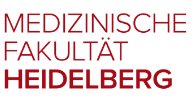
Ph.D. Melanie Fischer
Former colleague
(Institute of Medical Psychology)
M.A.
Fellow, Margarete-von-Wrangell habilitation program for women (Baden-Württemberg)
Medical/Professional background
- since 2018
Postdoctoral Researcher, Institute of Medical Psychology
- September 2016 – July 2018
Postdoctoral Fellow, Department of Psychology & Neuroscience, University of North Carolina at Chapel Hill, USA
- August 2015 – July 2016
Predoctoral Intern, Medical University of South Carolina & Ralph H. Johnson VA Medical Center, Charleston, South Carolina, USA
- 2012 – 2015
Graduate Research Assistant, Department of Psychology & Neuroscience (NIMH-funded project “UCAN2: Uniting Couples in the Treatment of Anorexia Nervosa,” Leitung Prof. Dr. Cynthia Bulik & Prof. Dr. Donald Baucom), University of North Carolina at Chapel Hill, USA
- 2010 – 2012
Graduate Teaching Assistant, Department of Psychology & Neuroscience, University of North Carolina at Chapel Hill, USA
Scientific background
- since 2020
Habilitation candidate, Faculty of Behavioural and Cultural Studies, University of Heidelberg, „Dyadic mechanisms of mental disorders: Behavior, psychobiology and emotion regulation in romantic partnerships" (Supervisor: Prof. Beate Ditzen)
- since 2016
Licensed Psychologist (LP) im Staat North Carolina, USA
- 2012 – 2016
Ph.D., Clinical Psychology Program, University of North Carolina at Chapel Hill, USA
- 2009 – 2012
M.A. Clinical Psychology Program, University of North Carolina at Chapel Hill, USA
- 2006 – 2009
B.Sc., Psychology, Technische Universität Braunschweig, Germany
Grants
2020-2025: Margarete-von-Wrangell Habilitation Program for Women (State Baden-Württemberg)
2020-2021: Foundation Grant, Heidelberg University (Dres Majic/Majic-Schlez): Accommodation in OCD: Dyadic psychobiology and emotion regulation as prognostic factors
2018-2020: National Institute of Mental Health (USA) project grant (R03): Social processes in RDoC: Function and dysfunction of interpersonal emotion regulation in depression and anxiety.
2016: Robert L. Weiss Student Research Award (2. place), Couple Therapy and Research Special Interest Group, Association for Behavioral and Cognitive Therapies
2014: Dissertation Research Award, American Psychological Association (APA)
2014: Dashiell Dissertation Startup Award, Department of Psychology and Neuroscience, University of North Carolina at Chapel Hill, USA
2009-2010: Fulbright Fellowship
2009-2012: Fellowship of the German National Academic Foundation
2009-2010: Fulbright Stipendium der Deutsch-Amerikanischen Fulbright Kommission
2009-2012: Stipendium der Studienstiftung des Deutschen Volkes
Professional memberships
Deutsche Gesellschaft für Psychologie e.V., DGPs, Fachgruppe Klinische Psychologie und Psychotherapie
Association for Behavioral and Cognitive Therapies (ABCT), Couples Research and Therapy Special Interest Group
Arbeits- und Forschungsschwerpunkte
Behavioral and emotion-related processes in dyadic interactions related to psychopathology
Emotion regulation, dysregulation, and coregulation in couples
Development and evaluation of cognitive-behavioral couple-based interventions (e.g., depression, OCD, eating disorders)
Dissemination of couple-based interventions in routine clinical care (Behavioral Couple Therapy for Depression, National Health Service England, Increasing Access to Psychological Treatments (IAPT) Initiative)
Aktuelle Projekte
Social Processes in RDoC: Function and Dysfunction of Interpersonal Emotion Regulation in Depression and Anxiety
Onlinestudie “Zwangsstörungen und Partnerschaft”; Validierung der deutschen Family Accommodation Scale
Pilotstudie: Partnerschaft und Zwangsstörung im Alltag (PaZ-Studie)
Entwicklung einer psychometrisch validierten deutschen Version des Couple Satisfaction Index
Web@T: Entwicklung eines online Informations- und Beratungsangebotes für Familien vor, während, oder nach einer Trennung
Stressregulation in Eltern-Kind Interaktionen und deren Zusammenhänge mit Behandlungsverläufen in der Kinder- und Jugendpsychiatrie
Editorial Board
Advisory Editor, Family Process


